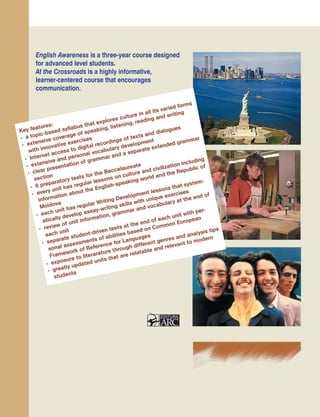Here are the answers to the exercises:
1. My name is Adam. Last week, my teacher made a presentation on symbols of the United Kingdom. Mrs. Baratu often describes other cultures for us. Were you aware of the school system in the United States? When I heard about it, I didn't think that there would be much of a difference between our educational systems. What classes will you take next year? Yesterday, Felicia told me that she is not going to university next September. She wants to go to art college.
2. What are you doing right now? Nothing much. I was just thinking of heading to the store when you called. Oh yeah? I hear that place is having a sale on
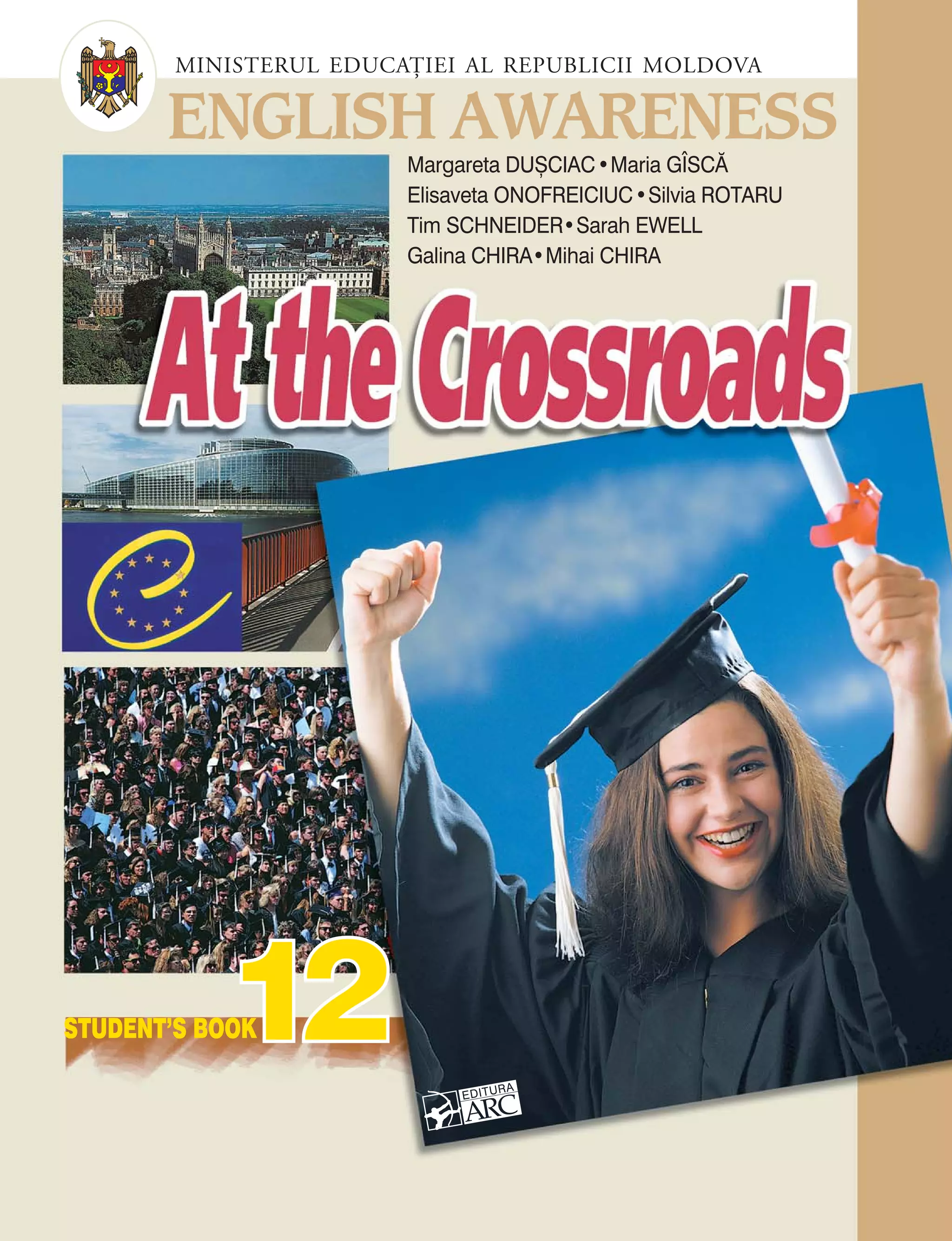
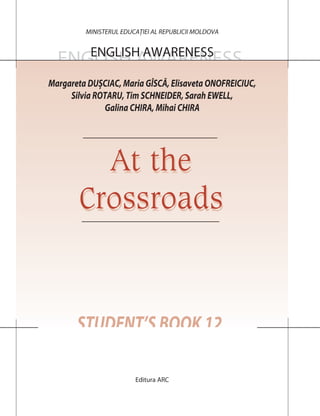
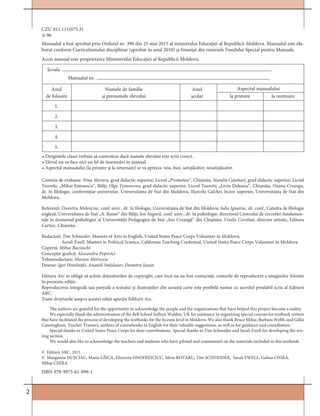
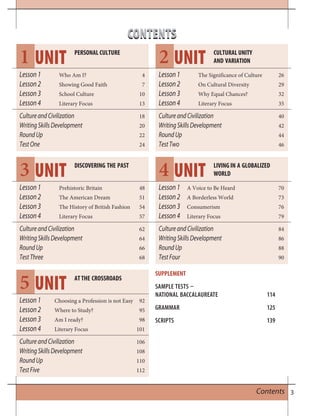
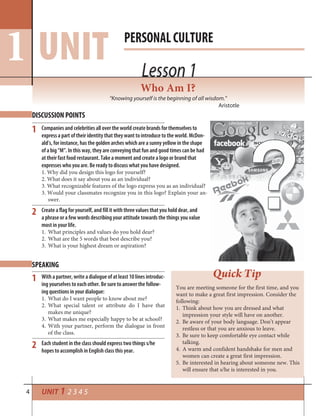
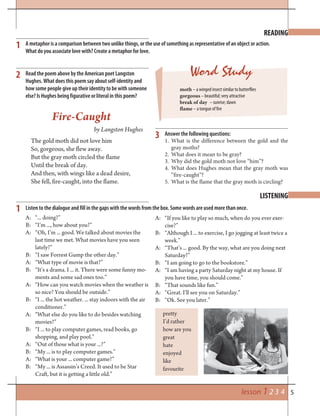
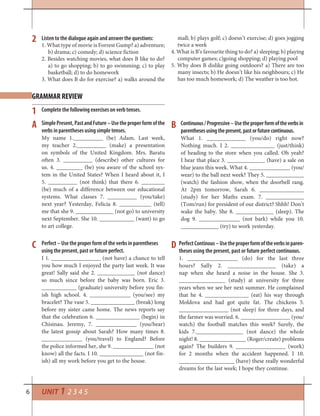
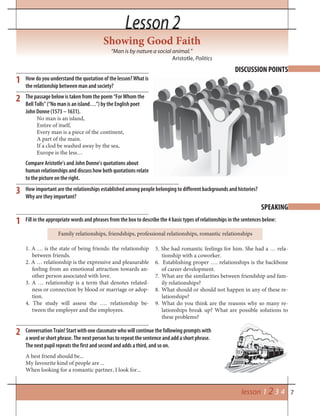
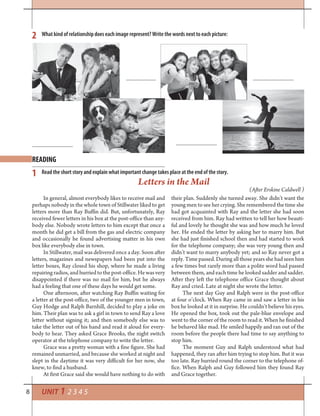
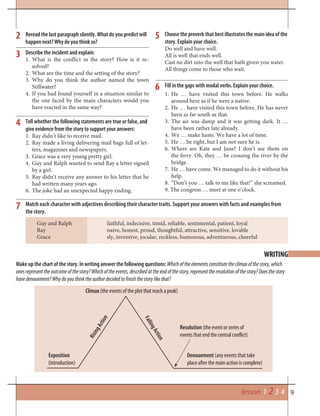
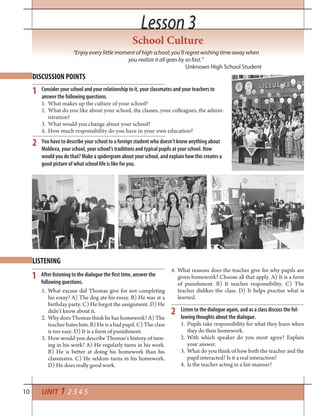
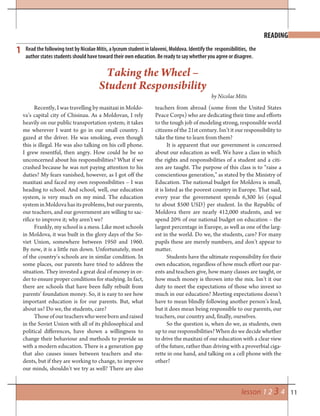
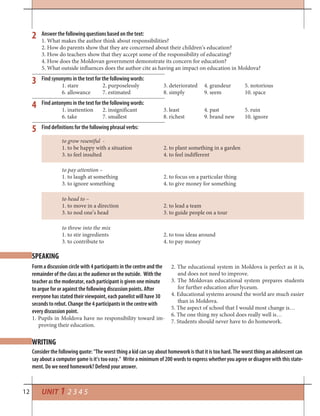
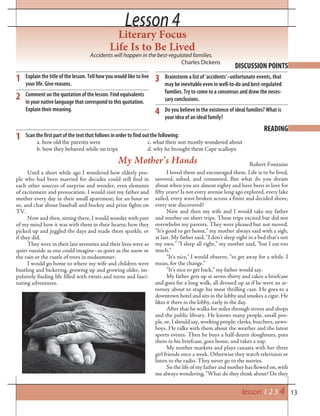
![14 UNIT 1 2 3 4 5
Work in pairs.
Predict what might have caused the parents’ fighting and what consequences are likely to result from
this fighting. Explain your point of view, while sharing it with the other pairs.
2
Readthenextextractfromthetextandcheckyourpredictions.
Statehowseriousthemattertheywerefightingaboutwas.
3
notice each other? Do they have strong emotions about each
other? But how could they?” The blood has slowed down.
The arms are inelastic. The eyes are dim. The fingers of my
father which once rippled along a violin can barely make un-
pleasant squeaks on that instrument any more. My mother
walks carefully, for her glasses do not focus properly where
her feet meet the stairs and sidewalks.
Yet one morning I came on my usual call, bringing a
New York paper, as is my custom, and some Cape scallops,
which are a delicacy both my father and mother appreciate
but cannot afford.
When I got in the apartment they were fighting.
Word Study
juggle, v. – to play tricks with/on
rustle [’r¤sl], n. – soft sound of things gently rubbing together
bustle, v. – to move quickly and excitedly
bicker, v. – to quarrel
wilt, v. – to lose energy, (here) to calm down
wistful, adj. – longing, yearning
sulky, adj. – silent and bad-humoured
slump, v. – to fall heavily (in a seat)
scrub, v. – to clean by rubbing
gnarled [’na:ld], adj.– twisted and crooked
Now this in itself was most extraordinary. They were
bickering and shouting about some obscure matter. As I
recall, it had something to do with an event some twenty-
five years previously and they had different ideas as to how
the event had turned out or where it had occurred, and the
discussion got hotter and hotter. At first I was amused, and
then I was alarmed. My father said, “That’s the way you are,
always so sure of yourself.”
“I ought to know. I was there.”
“I was there, too.”
“Well, you don’t remember then.”
“My memory is perfect,” my father shouted.
My mother said, “Don’t shout at me.”
“I’ll shout at who I please.”
“Not at me, you won’t shout.”
It went on like this with me standing there holding
the scallops in my hand and wondering. They kept at it like
newlyweds for about fifteen minutes. Finally my father got
real angry and took his hat off the bed he sat beside and
rushed out of the apartment slamming the door.
“Let him go,” my mother said.
“I guess I’ll have to. What were you fighting about?”
My mother shrugged. “I don’t remember. He’s just so
stubborn. I keep hoping he’ll outgrow it.”
“If he hasn’t now he never will.”
“Well, he better. I won’t put up with it much longer.”
I sat around for a while, and then I put the scallops in
the icebox. I was beginning to smell like Gloucester, Mass. I
told my mother not to worry. She said, “Humph!” I left.
Around dinnertime I began to wonder again, so I
called up.
My mother answered the phone and said my father
had not come home yet or called on the phone.
I hopped on a bus and went down to see my mother.
She had wilted a little and looked gloomy. “I hope he doesn’t
do anything foolish,” she said. “He’s not a young man, you
know.”
“I know. I’ll go roam around downtown. Maybe I can
find him.”
Now about ten years ago my father had been discon-
nected from the last real job he held. For the first time in
his life he had decided to soothe himself with alcohol after
4 Read the next passage and guessthemeaningincontextofthewordsandexpressionsinitalics. Answer the question:
Doyouthinkthefathercouldhavedesertedthemotherforanotherwoman?Explainwhyorwhynot.
which he became very talkative and a little belligerent.
After a while he had got over it and never touched the
stuff again, not even at birthday parties or Christmas. Yet
I had a notion he had probably gone off again, just like a
young, rebuffed lover. It was rather amazing to think of him,
at his age, being sulky and irritated with my mother and
she, for that matter, being wistful and lonesome like a girl at
her first quarrel. In a way it was rather refreshing. I did not
think they had it in them.
At any rate it had begun to pour rain, so I began walking
around the city, looking for my father.
Once or twice I thought I had a glimpse of him, but when
I got in out of the rain, it was not he but some other sad old](https://image.slidesharecdn.com/xiilimbaengleza-171208063641/85/Limba-engleza-Manual-pentru-cl-12-15-320.jpg)
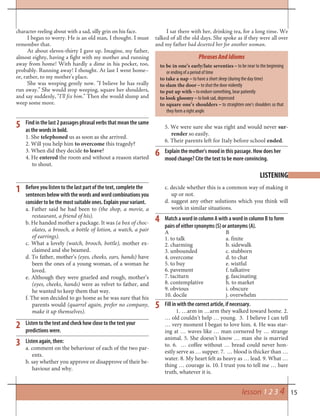
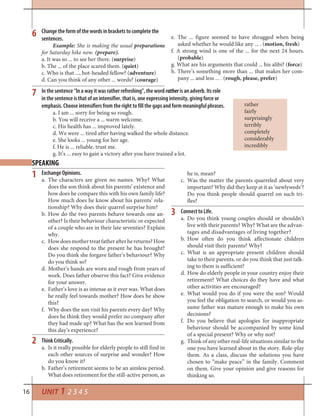
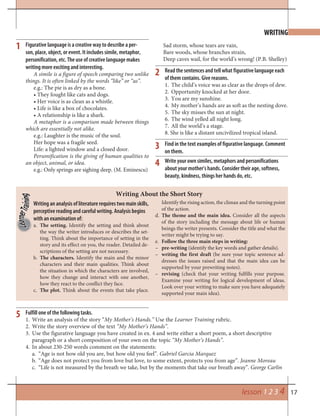
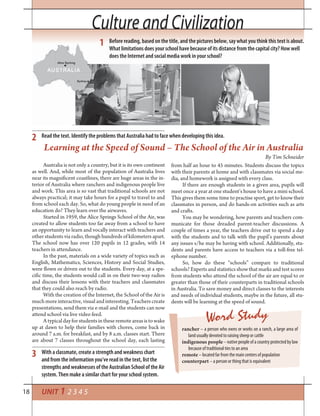
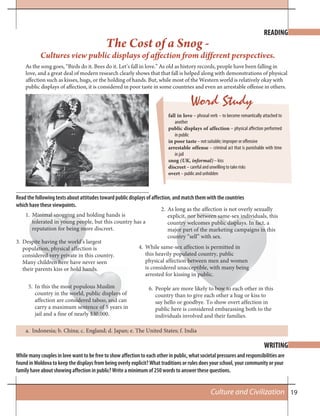
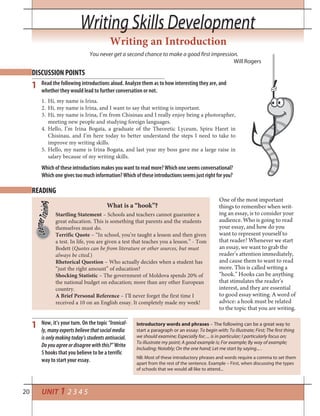
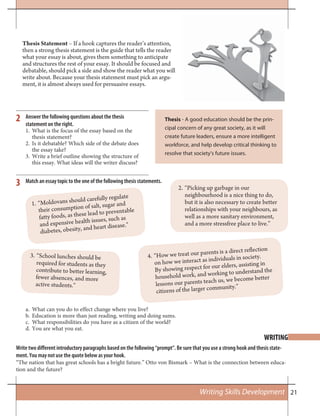
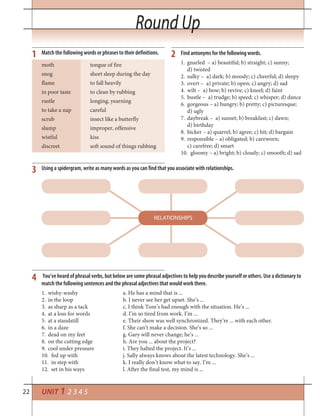
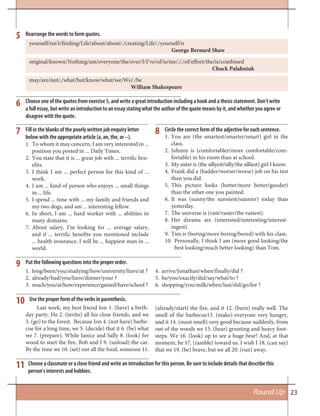
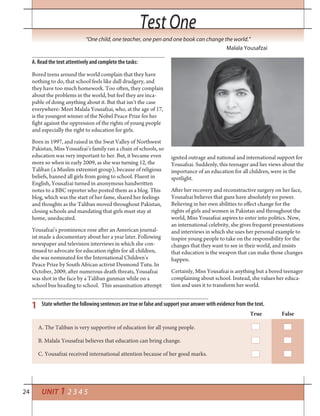
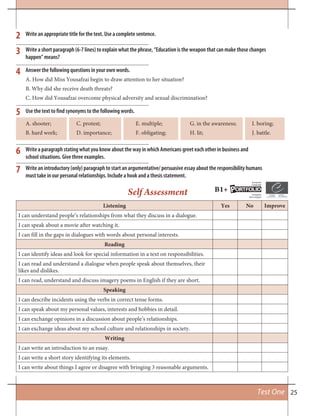
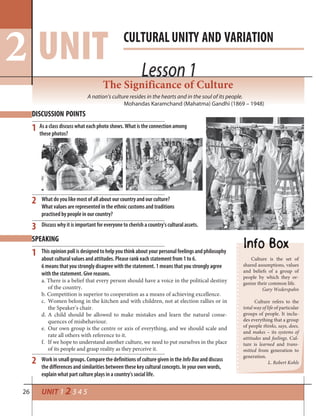
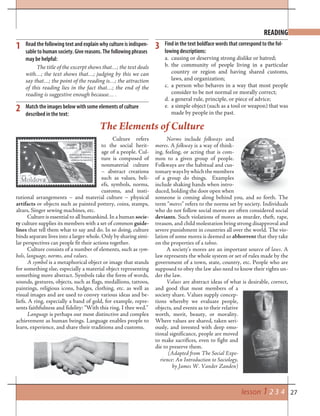
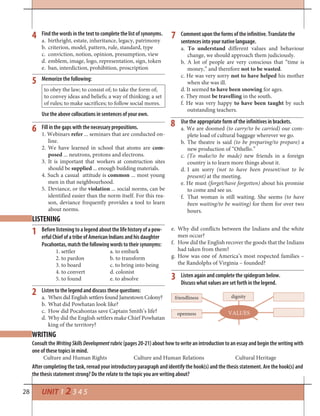
![29
Lesson 2Lesson 2
On Cultural Diversity
“If we cannot end now our differences, at least we can help make the world safe for diversity.”
John F. Kennedy
READING
DISCUSSION POINTS
2
Identify characteristics of culturally different groups and discuss them in small groups.
As a class, discuss the issue of cultural unity and variation. In what ways are all cultures similar? How are they different?
Readthepoem“WeandThey”bythewell-knownEnglishwriterRudyardKipling. Scanthepoemandgetreadytodiscusshowit
tacklestheissueofculturaldiversity.
Father, Mother, and Me
Sister and Auntie say
All the people like us are We,
And everyone else is They.
And They live over the sea,
While We live over the way,
But – would you believe it?
– They look upon We
As only a sort of They!
...And They who live up a tree,
And feast on grubs and clay,
(Isn’t it scandalous?) look upon We
As a simply disgusting They!
...They like Their friends for tea.
We like Our friends to stay;
And, after all that, They look upon We
As an utterly ignorant They!
We eat kitcheny food.
We have doors that latch.
They drink milk or blood,
Under an open thatch.
We have Doctors to fee.
They have Wizards to pay.
And (impudent heathen!)
They look upon We
As a quite impossible They!
All good people agree,
And all good people say,
All nice people, like Us, are We
And every one else is They:
But if you cross over the sea,
Instead of over the way,
You may end by (think of it!) looking on We
As only a sort of They !
We and They (1926) by Rudyard Kipling, abridged
1
1
Word Study
grub, n. – 1. larva of an insect; 2. (sl)food
latch, n.–ametalbarwithacatchandleverusedforfasteningadoor
or gate; v. – fasten (a door or gate) with a latch
thatch, n. – a roof made of plant materials
heathen [’hi:ðn], n.–(plwithout-swhenusedwiththe)1.believ-
er in a religion other than the chief world religions; 2. person whose
morals, etc are disapproved of; wild, ill-mannered youth
lesson 1 2 3 4](https://image.slidesharecdn.com/xiilimbaengleza-171208063641/85/Limba-engleza-Manual-pentru-cl-12-30-320.jpg)
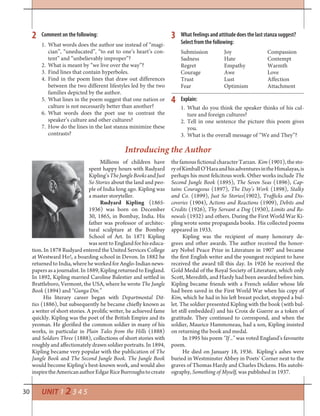
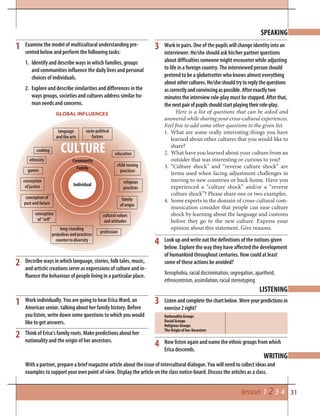
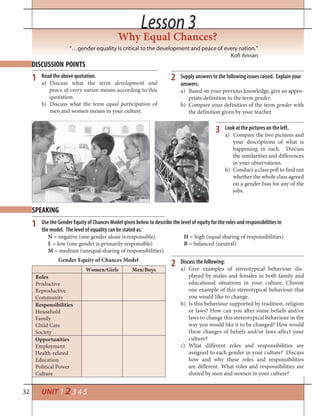
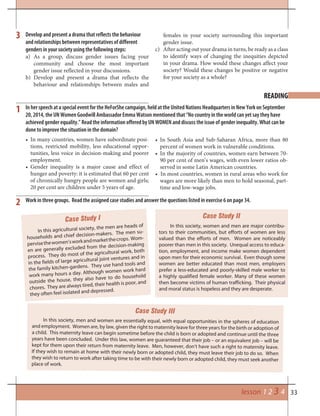
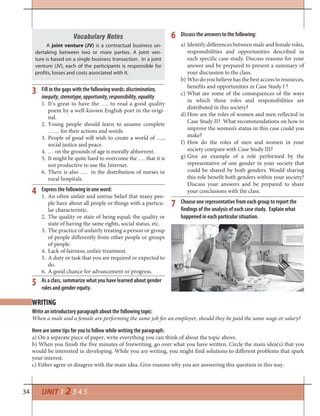
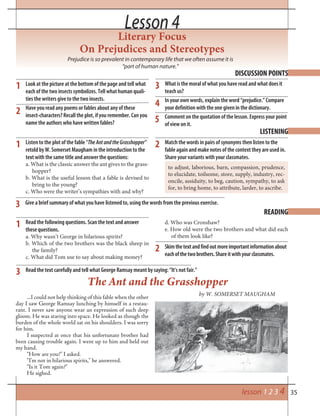
![36 UNIT 1 2 3 4 5
unscrupulous [¤n’skru:pj†l¢s], adj. – not guided by con-
science
qualm [kwa:m], n. – feeling of doubt (esp. about whether one is
doing or has done right)
convict [k¢n’vlkt], v. – to declare in law court that somebody is
guilty (of a crime)
vindictive, adj. – having or showing a desire for revenge
gamble, v. – to play games of chance for money
scapegrace, n. – an unincorrigible rascal; good-for-nothing person
dissolute [’dls¢lu:t], adj. – (of persons) given up to immoral
conduct; (of behaviour) evil, vicious
wrathful [’r‡³fl], adj. – filled with indignation or anger
Word Study
“Yes, it’s Tom again.”
“Stop thinking about him. You’ve done everything in
the world for him. You must know by now that he’s quite
hopeless.”
I suppose every family has a black sheep. Tom had
been a sore trial to his for twenty years. He had begun life
decently enough: he went into business, married and had
two children. The Ramsays were perfectly respectable
people, and there was every reason to suppose that Tom
Ramsay would have a useful and honourable career. But
one day, without warning, he announced that he didn’t like
work and that he wasn’t suited for marriage. He wanted to
enjoy himself. He would listen to no expostulations. He left
his wife and his office. He had a little money, and he spent
two happy years in the various capitals of Europe. Rumours
of his doings reached his relations from time to time, and
they were profoundly shocked. He certainly had a very
good time. They shook their heads and asked what would
happen when his money was spent. They soon found out:
he borrowed. He was charming and unscrupulous. I have
never met anyone to whom it was more difficult to refuse
a loan. He made a steady income from his friends and he
made friends easily. But he always said that the money you
spent on necessities was boring; the money that was amus-
ing to spend was the money you spent on luxuries. For this
he depended on his brother George. He did not waste his
charm on him. George was a serious and respectable man.
Once or twice he fell to Tom’s promises of amendment and
gave him considerable sums in order that he might make
a fresh start. On these Tom bought a motorcar and some
very nice jewellery. But when circumstances forced George
to realise that his brother would never settle down, and he
washed his hands of him, Tom, without a qualm, began to
blackmail him. It was not very nice for a respectable lawyer
to find his brother shaking cocktails behind the bar of his
favourite restaurant or to see him waiting on the box-seat
of a taxi outside his club. Tom said that to serve in a bar
or to drive a taxi was a perfectly decent occupation, but if
George could oblige him with a couple of hundred pounds
he didn’t mind for the honour of the family giving it up.
George paid.
Once Tom nearly went to prison. George was terribly
upset. He went into the whole discreditable affair. Really
Tom had gone too far. He had been wild, thoughtless and
selfish, but he had never before done anything dishonest, by
which George meant illegal; and if he were prosecuted he
would assuredly be convicted. But you cannot allow your
only brother to go to gaol. The man Tom had cheated, a
man called Cronshaw, was vindictive. He was determined
to take the matter into court; he said Tom was a scoun-
drel and should be punished. It cost George an infinite deal
of trouble and five hundred pounds to settle the affair. I
have never seen him in such a rage as when he heard that
Tom and Cronshaw had gone off together to Monte Carlo
the moment they cashed the cheque. They spent a happy
month there.
For twenty years Tom raced and gambled, danced and
ate in the most expensive restaurants, and dressed beauti-
fully. He always looked as if he had just stepped out of a
bandbox. Though he was forty-six you would never have
taken him for more than thirty-five. He was a most amusing
companion and though you knew he was perfectly worth-
less you could not but enjoy his society. He had high spirits
and incredible charm. I never lent him fifty pounds without
feeling that I was in his debt. Tom Ramsay knew everyone,
and everyone knew Tom Ramsay. You could not approve
of him, but you could not help liking him.
Poor George, only a year older than his scapegrace
brother, looked sixty. He had never taken more than a fort-
night’s holiday in the year for a quarter of a century. He
was in his office every morning at nine-thirty and never left
it till six. He was honest, industrious and worthy. He had
a good wife, to whom he had never been unfaithful even in
thought, and four daughters to whom he was the best of
fathers. He made a point of saving a third of his income
and his plan was to retire at fifty-five to a little house in the
country where he proposed to cultivate his garden and play
golf. His life was blameless. He was glad that he was grow-
ing old because Tom was growing old too. He rubbed his
hands and said:
“It was all very well when Tom was young and good-
looking, but he’s only a year younger than I am. In four years
PhrasesAndIdioms
to bring home to – to make unmistakably clear
to be provided for – to be supplied with
to be a burden to somebody–tocausesomebodyexpenseandtrouble
to be/not to be suited for (to) – to be/not to be fitted
to wash one’s hands of – to disclaim interest in, responsibility for, or
further connection with
to settle down – to take up an ordered or stable life
to be hopeless – a. having no expectation of good or success;
b. incapable of redemption or improvement
to chuck someone/something – to give up; to abandon
to be a sore trial to – to cause trouble or hardships](https://image.slidesharecdn.com/xiilimbaengleza-171208063641/85/Limba-engleza-Manual-pentru-cl-12-37-320.jpg)
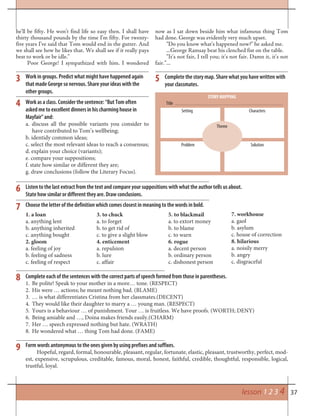
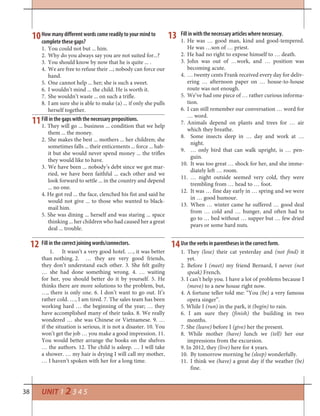
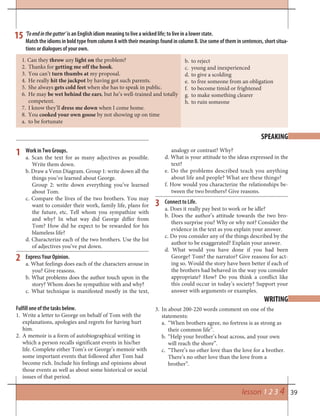
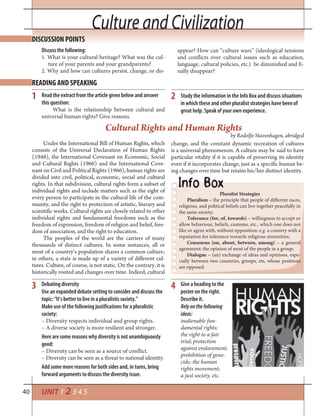
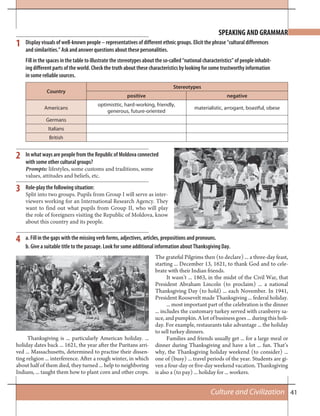
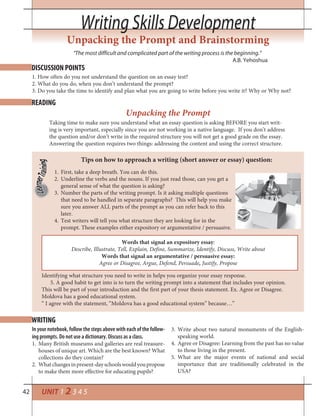
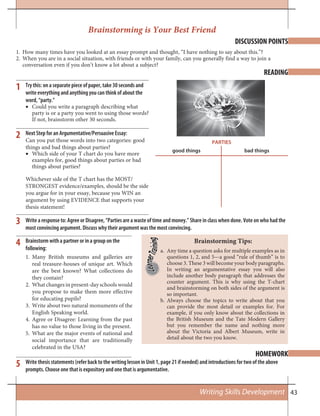
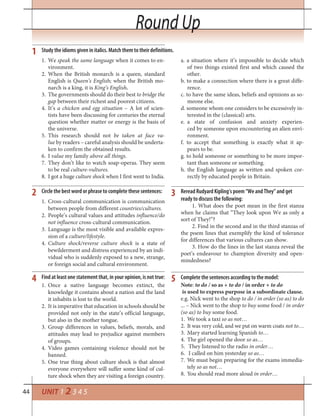
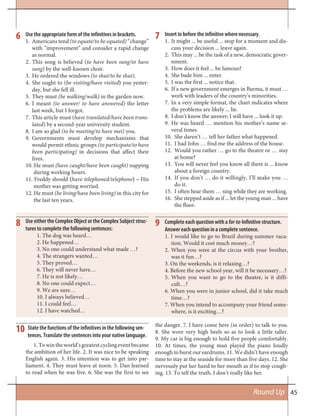
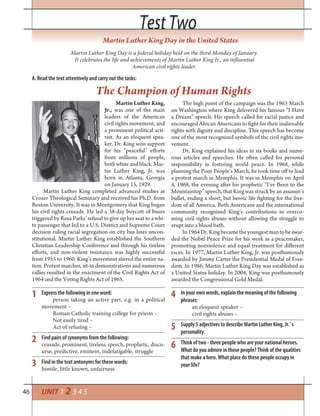
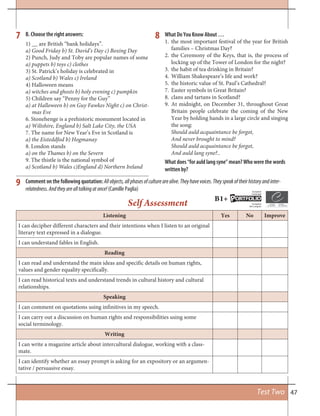
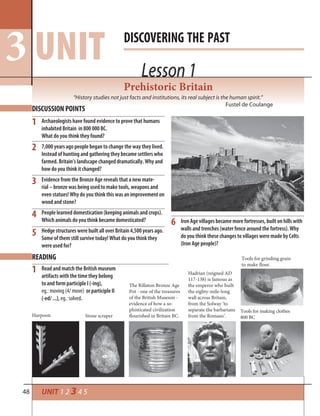
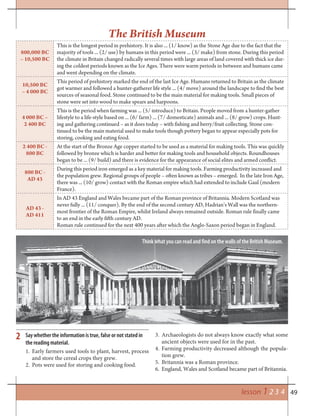
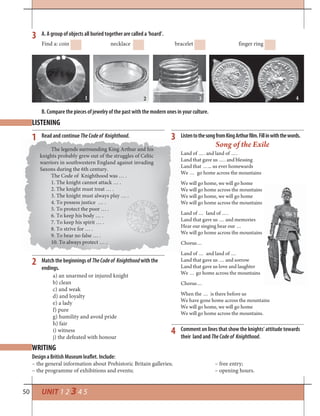
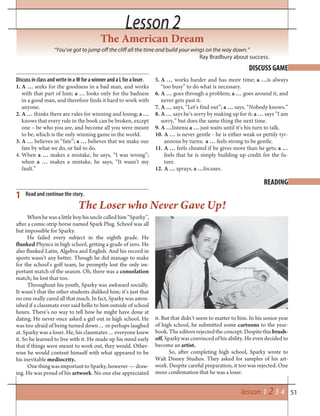
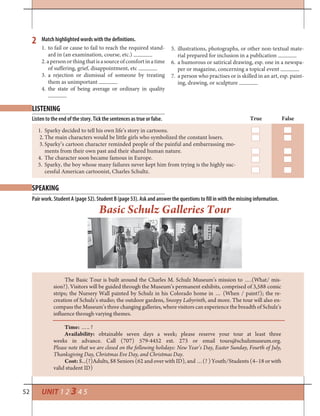
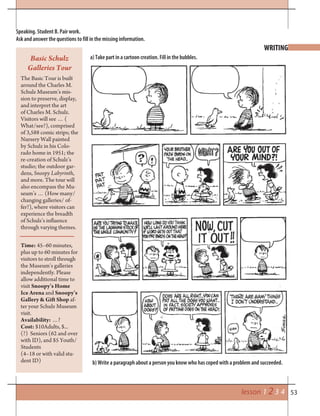
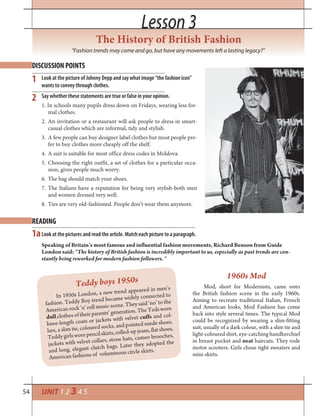
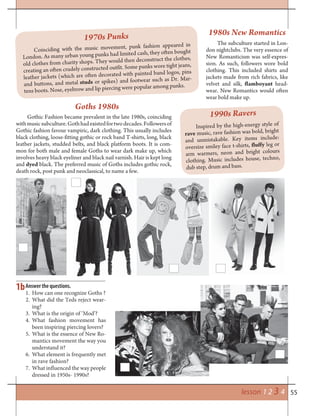
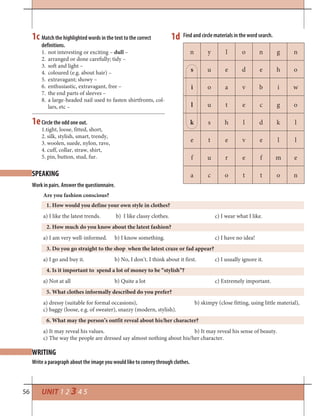
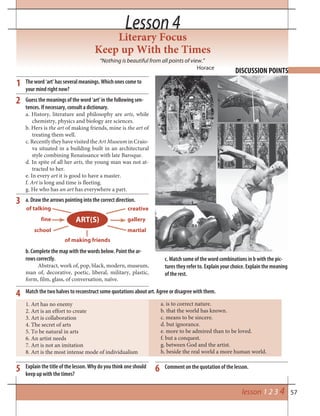
![58
READING
Work in pairs. The characters of the story “FairofFace”
that you are going to read are John Franklin, the narrator,
Aubrey Melcombe, Deborah Franklin and Rosamund Clegg.
Try to predict:
a. the relationships between the characters.
b. the occupation each of them has.
You may choose out of the following: assistant
at the museum, student, in charge of the museum, no
occupation, colleague.
Share your predictions with the other pairs.
Work in two groups. Each group will have a definite time to
cope with the following tasks:
Group 1. Scan the text to find as much evidence
as possible that will either confirm or invalidate the
predictions you have made. Get ready to answer the
questions of Group 2.
Group 2. Write down as many questions as you
manage about the characters you would like to find
answers to by asking Group 1.
Work in the same groups. Discuss what you have learned
about the characters and their relationships. Synthesize your
findings.Chooseaspeakertosharethefinalvariant.Compare
the variants. Come to a consensus. Draw conclusions.
1 2
3
John Franklin, who was my contemporary at Ox-
ford, invited me to stay with his people at Markhampton
for the Markshire Hunt Ball. He and his sister were get-
ting up a small party for it, he said.
“I’ve never met your sister,” I remarked. “What is she
like?”
“She is a beauty,” said John, seriously and simply.
I thought at the time that it was an odd, old-fash-
ioned phrase, but it turned out to be strictly and literally
true. Deborah Franklin was beautiful in the grand, classic
manner. She didn’t look in the least like a film star or a
model. She had never been a deb, which was just as well,
for she would have made the other debs look more than
ordinarily silly. I suppose her vital statistics were in order,
but looking at her you forgot about them. It was the sheer
beauty of her face that took your breath away.
With looks like that, it would be asking too much to
expect anything startling in the way of brains, and I found
Deborah, though amiable, a trifle dull. She was of course
well aware of her extraordinary good looks, and was per-
fectly prepared to discuss them, without conceit, just as a
man seven feet high might talk about the advantages and
inconveniences of being tall.
Most of our party were old friends of the Franklins,
who took Deborah for granted as a local phenomenon, but
among them was a newcomer–a young man with a beard
named Aubrey Melcombe, who had lately taken charge
of the local museum. As soon as he set eyes on Deborah
he said:
“We have never met before, but your face, of course,
is perfectly familiar.”
Deborah had evidently heard that one before.
FAIR OF FACE by Cyril Hare
“I never give sittings to photographers,” she said, “but
people will snap me in the street. It’s such a nuisance.”
“Photographs!” said Aubrey. “I mean your portrait–
the one that was painted four hundred years ago. Has no-
body ever told you that you are the living image of the
Warbeck Titian?”
“I’ve never heard of the Warbeck Titian,” said De-
borah, which was rather letting the side down, for War-
beck Hall is near Markhampton and its pictures are fa-
mous, though of course only visitors go to see them.
“Truly,” said Aubrey, “I dwell among the Philistines.
But you shall judge for yourself. Lord Warbeck is lending
the Titian to an exhibition in aid of the Cathedral Fund
which we are organizing in the spring. I’ll send you a ticket
for the opening.”
Then he went off to dance with Rosamund Clegg,
Word Study
deb. (short for debutante) [’debju:ta:nt], n. – (French) a
young girl or woman during her first season in society
conceit [k¢n’si:t], n. – too high an opinion of oneself or of one’s
ability, importance, etc.
nuisance [’nju:sns], n. – thing or person that annoys, troubles, of-
fends or is disagreeable
tint, n. – a. variety of colour; b. a delicate or pale colour
carmine [’k¡:mln], adj. – deep red with a tingle of purple
garb, n. – kind of clothing
unruffled, adj. – not disturbed, calm
mirthlessly, adv. – without joy or fun
wryly [’ralll], adv. – ironically
10
20
30
40
Read the text and check. Tell whether you agree with the
author that if a person has good looks “it would be asking
too much to expect anything startling in the way of brains.”
4
UNIT 1 2 3 4 5](https://image.slidesharecdn.com/xiilimbaengleza-171208063641/85/Limba-engleza-Manual-pentru-cl-12-59-320.jpg)
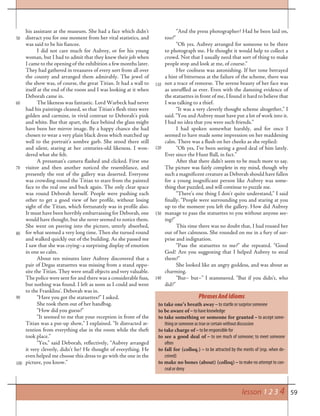
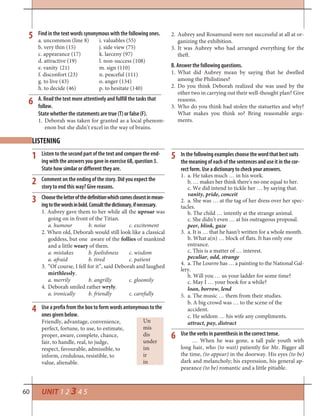
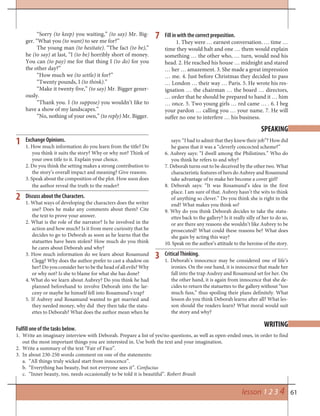
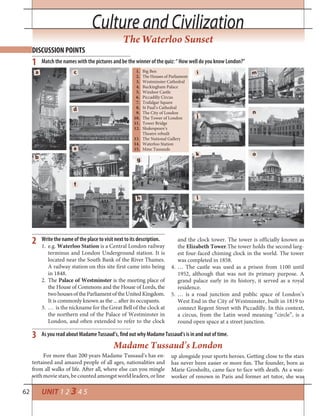
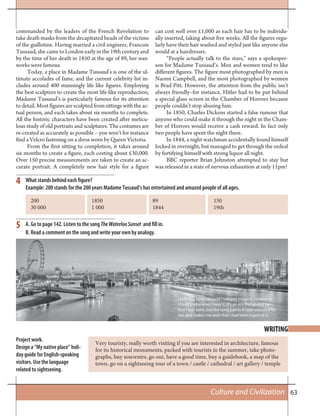
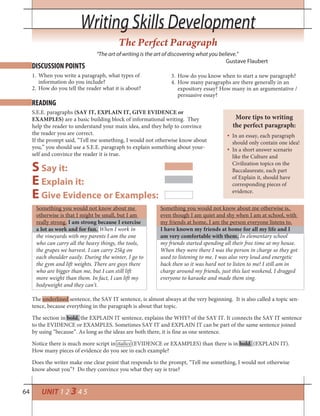
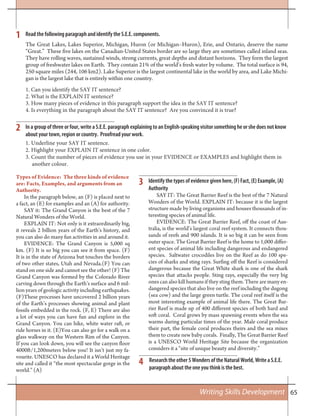
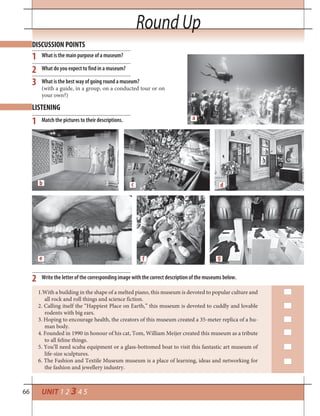
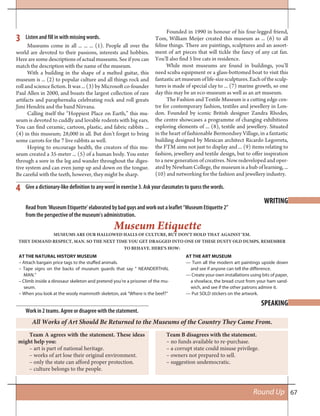
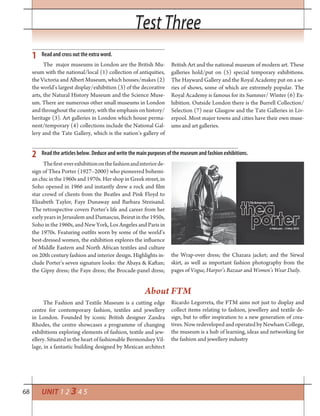
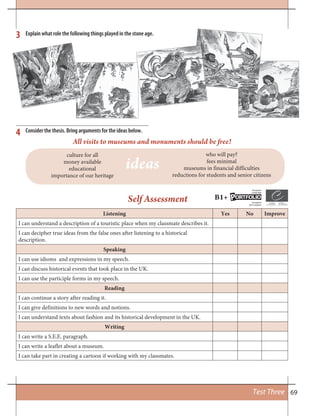
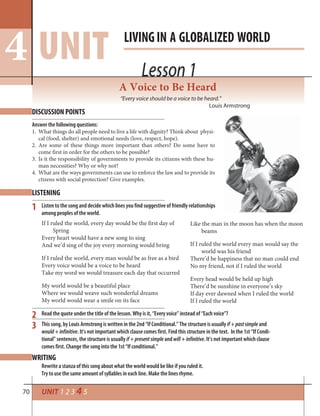
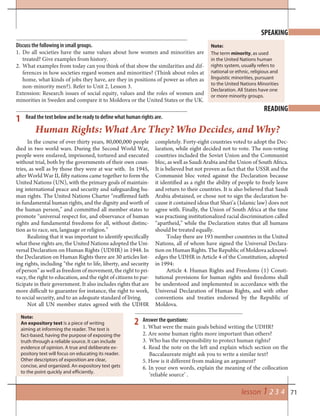
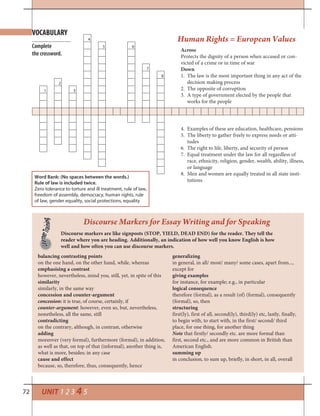
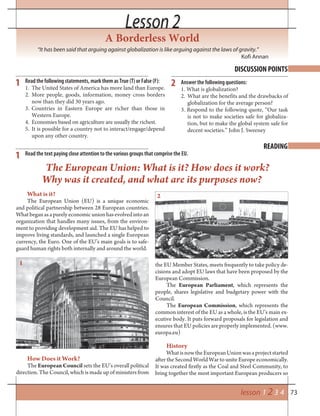
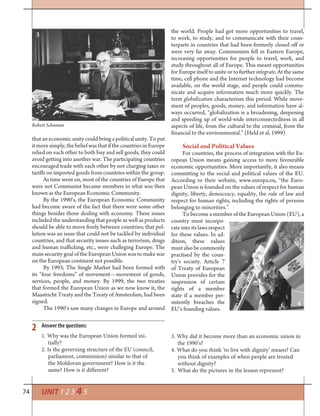
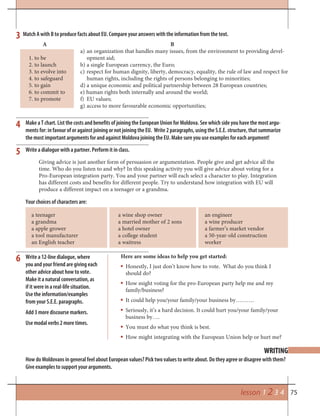
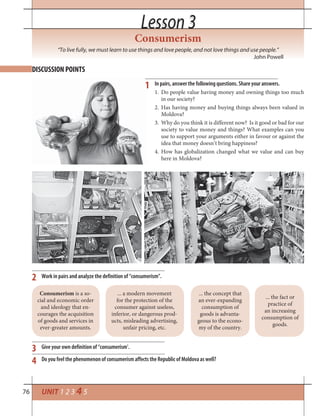
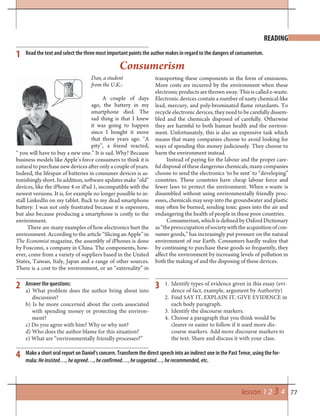
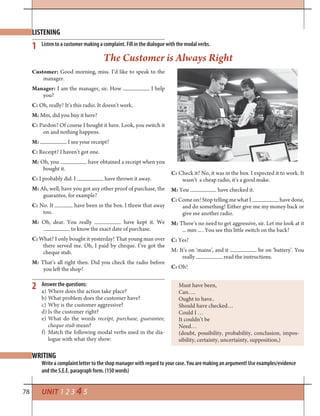
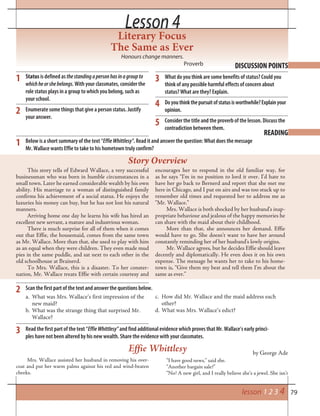
![80 UNIT 1 2 3 4 5
young or good-looking, and when I asked her if she wanted
any nights off she said she wouldn’t go out after dark for
anything in the world. What do you think of that?”
“That’s too good to be true.”
“No, it isn’t. Wait and see her. She came here from the
intelligence office about two o’clock and said she was willing
to ‘lick right in.’ You wouldn’t know the kitchen.”
“What nationality?”
“None–that is, she’s a home product. She’s from the
country– and green! But she’s a good soul, I’m sure. As soon
as I looked at her I just felt sure that we could trust her.”
“Well, I hope so. If she is all that you say, give her
any pay she wants–put lace curtains in her room and
subscribe for all the story papers on the market.”
“Bless you, I don’t believe she’d read them. Every time
I’ve looked into the kitchen she’s been working like a Trojan
and singing ‘Beu-lah Land.’”
“Oh, she sings, does she? I knew there’d be some draw-
backs.”
“You won’t mind that. We can keep the doors
closed.”
The dinner-table was set in tempting cleanliness.
Mrs. Wallace the arrangement of glass and silver and
gave a nod of approval and relief. Then she touched the
bell and in a moment the new servant entered.
She was a tall woman who had said her last farewell
to girlhood.
Then a very strange thing happened.
Mr. Wallace turned to look at the new girl and his eyes
enlarged. He gazed at her as if fascinated either by cap or
freckles. An expression of wonderment came to his face and
he said, “Well, by George!”
The girl had come very near the table when she took
the first overt glance at him. Why did the tureen sway in her
hands? She smiled in a frightened way and hurriedly set the
tureen on the table.
Mr. Wallace was not long undecided, but during that
moment of hesitancy the panorama of his life was rolled
backward. He had been reared in the democracy of a small
community, and the democratic spirit came uppermost.
“This isn’t Effie Whittlesy?” said he.
“For the land’s sake!” she exclaimed, backing away.
“You don’t know me.”
“Well, if it ain’t Ed Wallace!”
Mrs. Wallace settled back in her chair blinking, first
at her husband and then at the new girl, vainly trying to
understand what it meant.
She saw Mr. Wallace reach awkwardly across the ta-
ble and shake hands with the new girl and then she found
voice to gasp, “Can you imagine!”
Mr. Wallace was confused and without a policy. He
was wavering between his formal duty as an employer and
his natural regard for an old friend. Anyway, it occurred to
him that an explanation would be timely.
“This is Effie Whittlesy from Brainerd,” said he. “I
used to go to school with her. She’s been at our house often.
I haven’t seen her for–I didn’t know you were in Chicago,”
turning to Effie.
“I thought you were still at Brainerd,” said Mr. Wal-
lace, after a pause.
“I left there a year ago November.
“The family’s all broken up, eh?” asked Mr. Wallace.
“Gone to the four winds since mother died.”
“That will be all for the present, Effie,” said Mrs. Wal-
lace.
Effie gave a startled “Oh!” and vanished into the
kitchen.
“It means,” said Mr. Wallace, “that we were children
together, made mud pies in the same puddle, and sat next
to each other in the old schoolhouse at Brainerd. She is a
Whittlesy. Everybody in Brainerd knew the Whittlesys.
Large family, all poor as church mice, but sociable–and
freckled. Effie’s a good girl.”
“Effie, Effie! And she called you Ed!”
“My dear, there are no misters in Brainerd. Why
shouldn’t she call me Ed! She never heard me called any-
thing else.”
“She’ll have to call you something else here. You tell
her so.”
“Now, don’t ask me to put on any airs with one of
the Whittlesys, because they know me from way back. She
has been at our house, almost like one of the family, when
20
10
Word Study
tempting [’tempti²], adj. – attractive
tureen [t¢’ri:n], n. – a deep, large serving pot for soup
gasp, v. – to say in a breathless way
stuck up, adj. – pompous; snobbish
snob, n. – person who pays too much respect to social position or
wealth, or who dislikes persons who are of lower social position
menial [’mi:nl¢l], adj. – suitable for a servant
taunt [t¬:nt], v. – to jeer at, to mock
tickled, adj. – excited pleasantly, amused
PhrasesAndIdioms
to assist someone to do (in doing) something–tohelpsome-
one to do sth.
to say farewell to one’s girl/ boy/ child/ hood–tobenomore
in the state or time of being a girl/ a boy/ or a child
to go to the four winds – to go into different directions
a man (child) of the soil – one who works on the land
to be uneasy about something – to be uncomfortable, restless
about something
to put on airs – to pretend to be important
to work one’s way through college/ university – to have a
paid job while studying to meet costs
30
40
50
60
70
80](https://image.slidesharecdn.com/xiilimbaengleza-171208063641/85/Limba-engleza-Manual-pentru-cl-12-81-320.jpg)
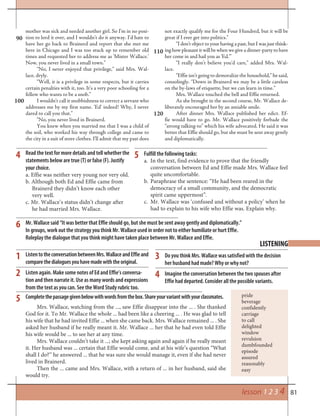
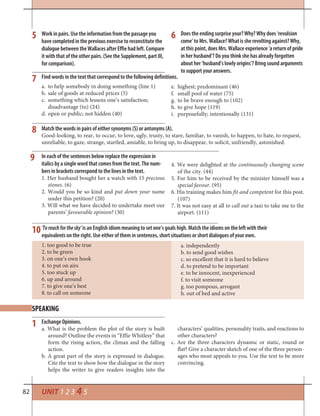
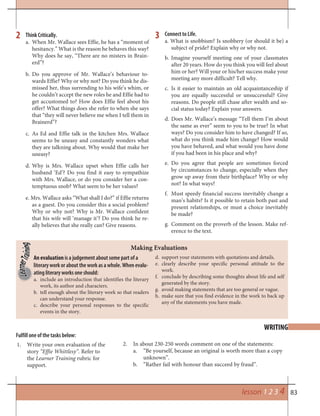
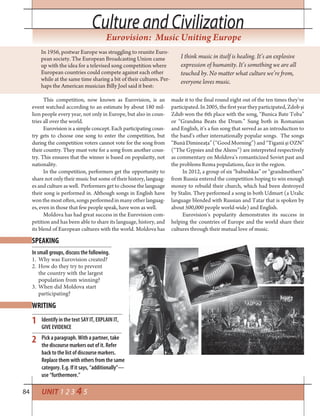
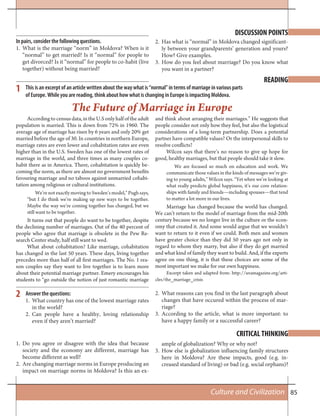
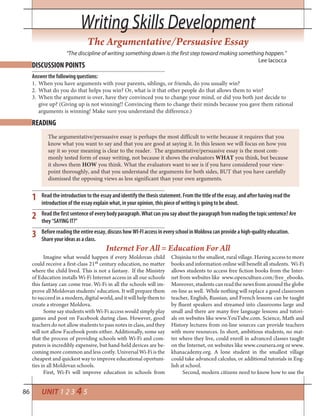
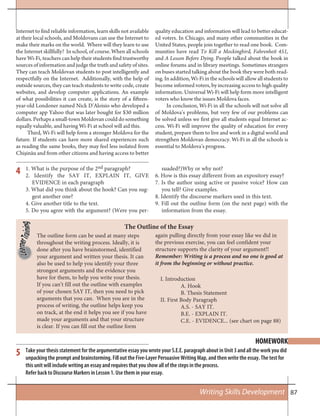
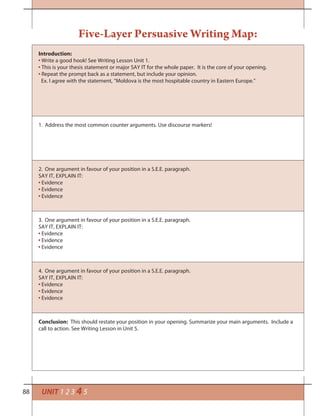
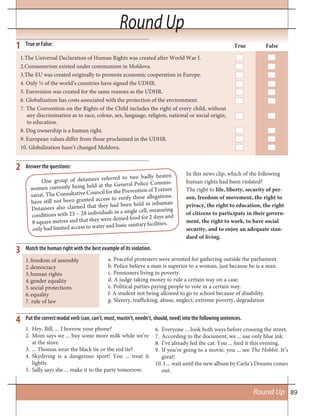
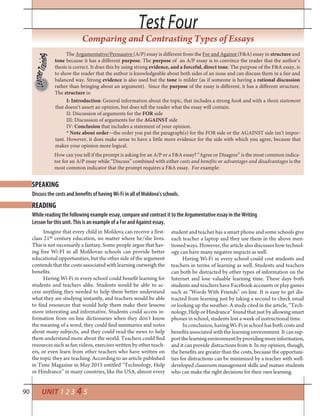
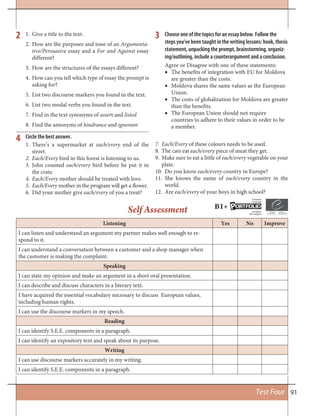
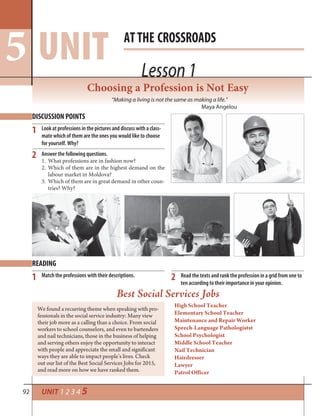
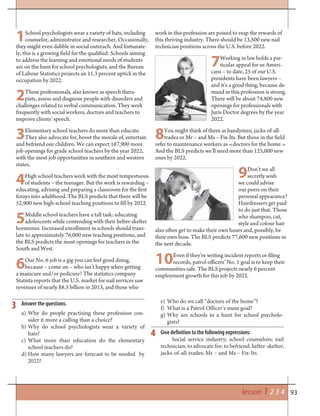
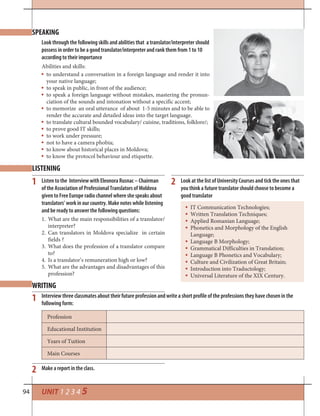
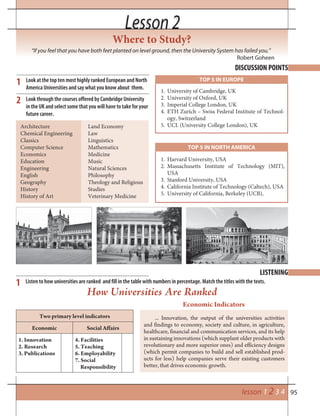
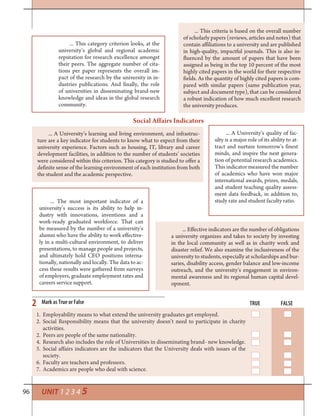
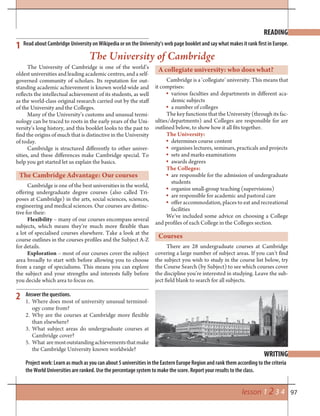
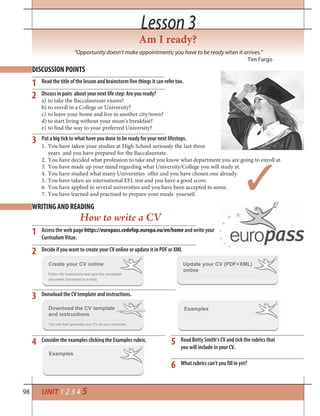
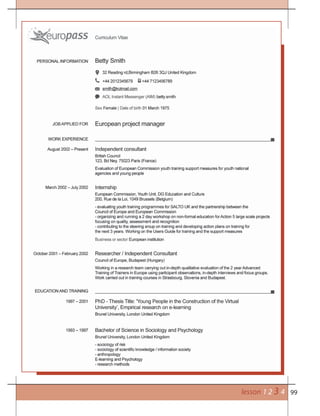
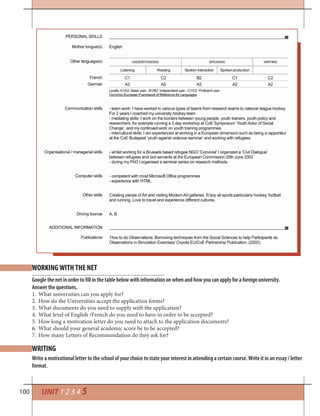
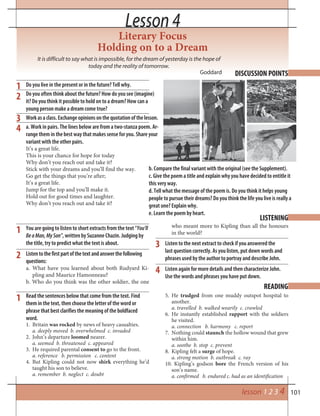
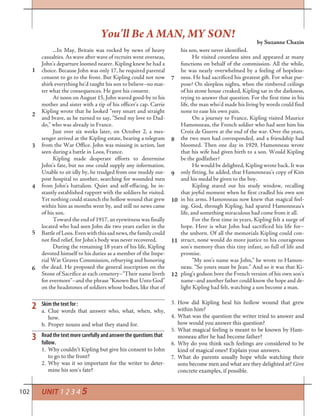
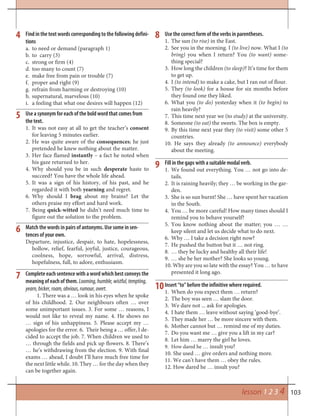
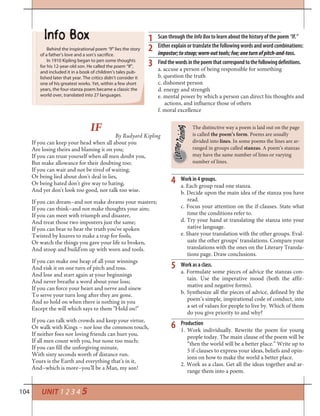
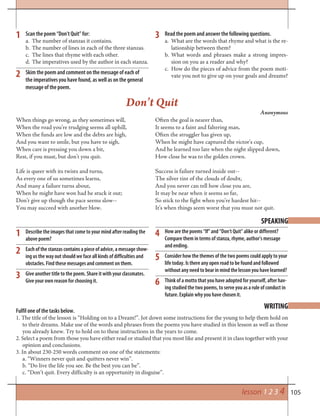
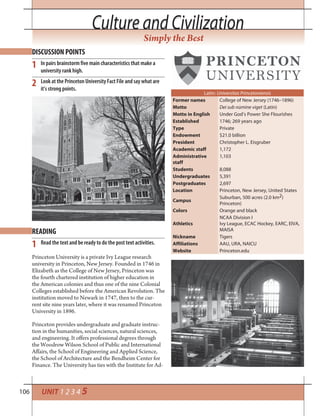
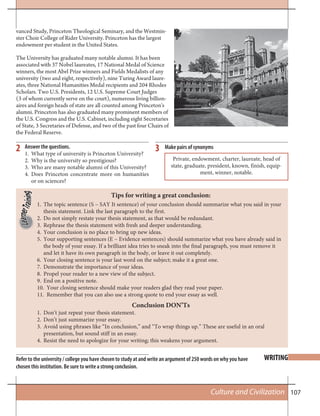
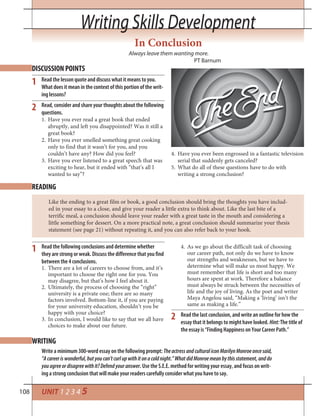
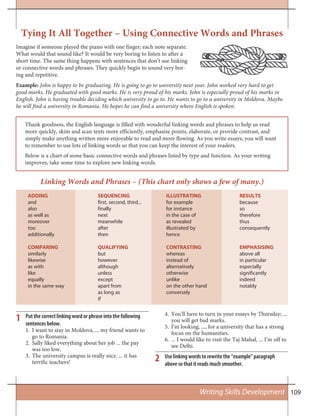
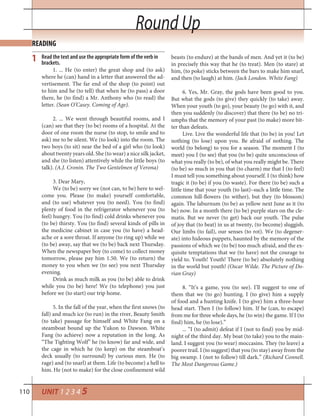
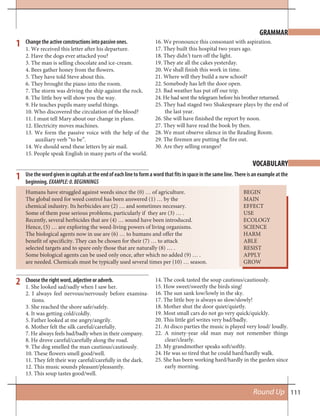
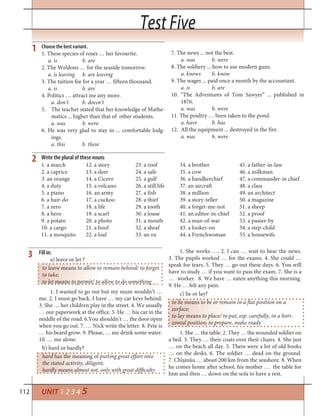
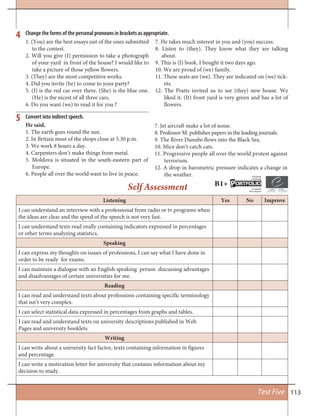
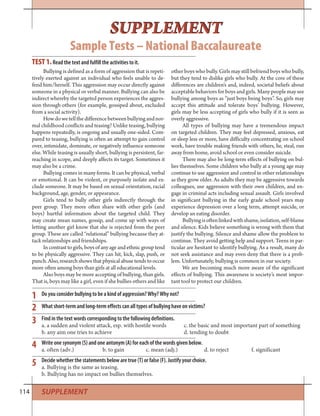
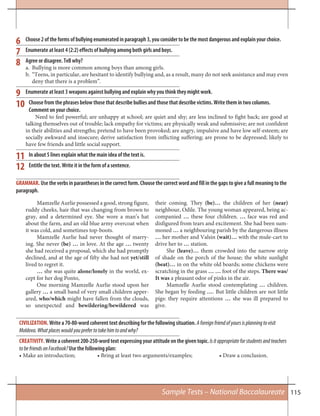
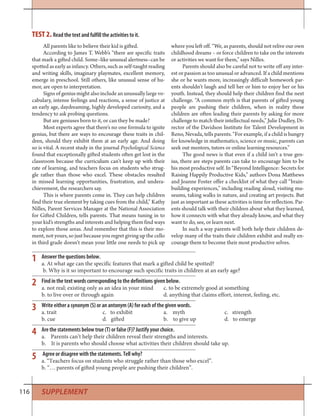
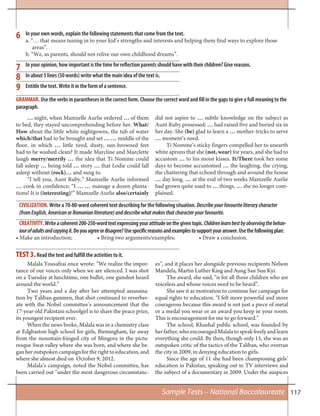
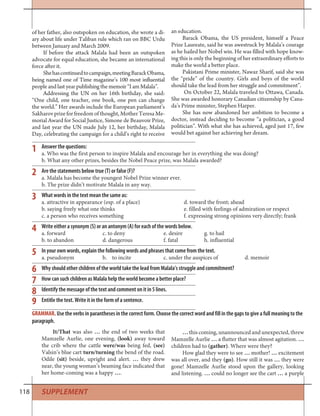
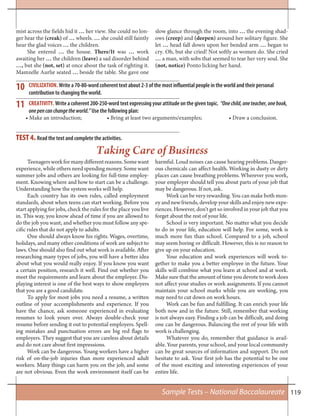
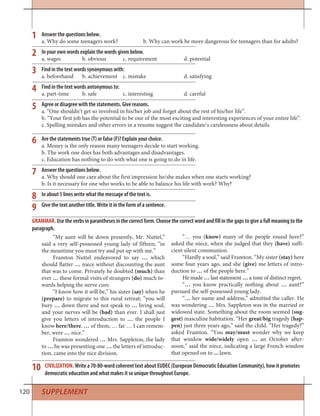
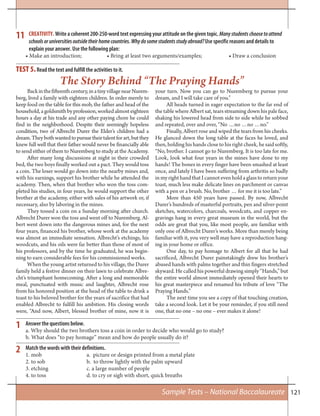
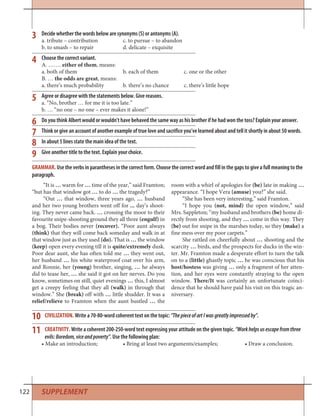
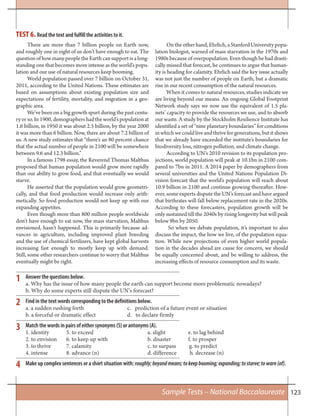
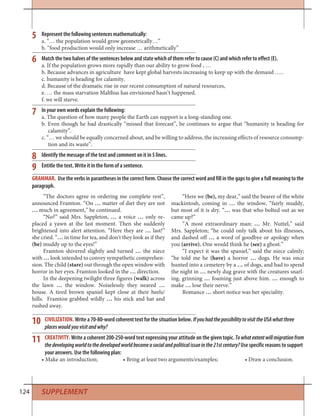
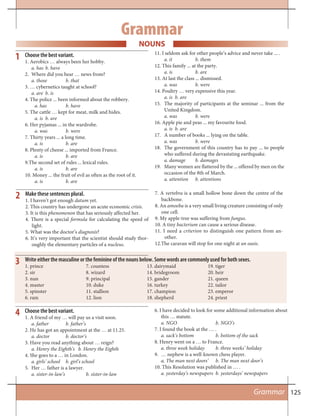
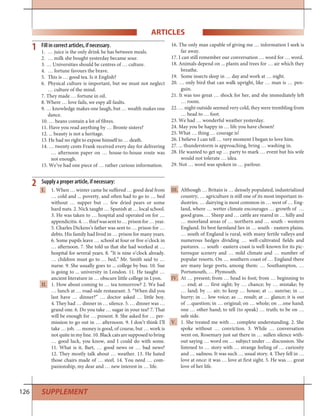
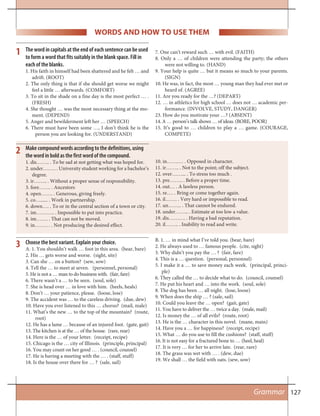
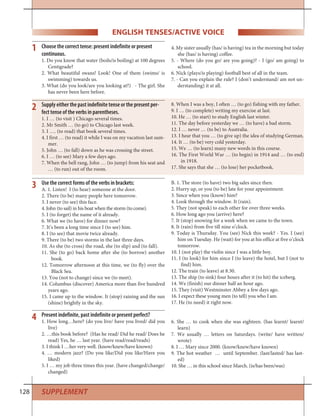
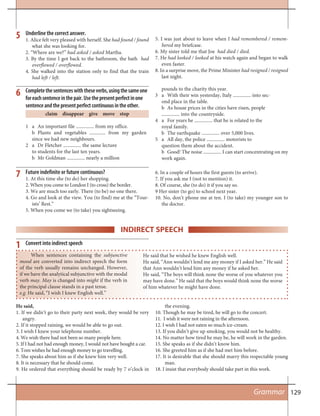
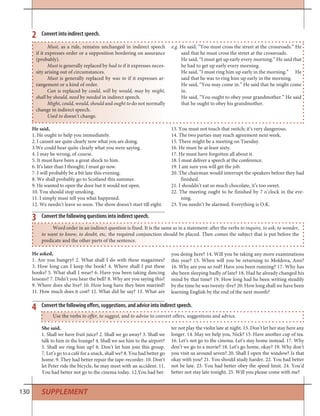
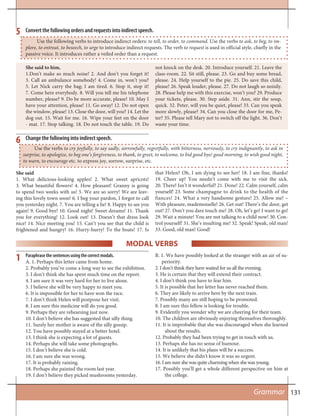
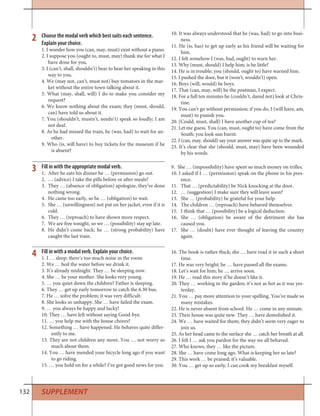
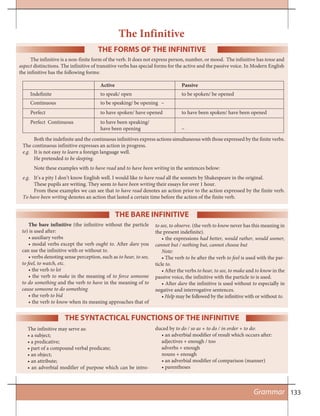
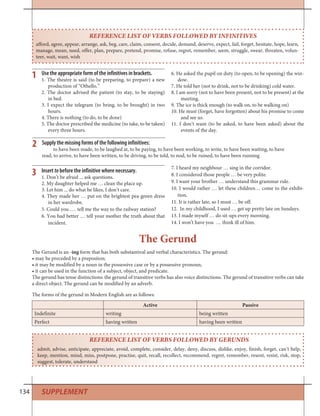
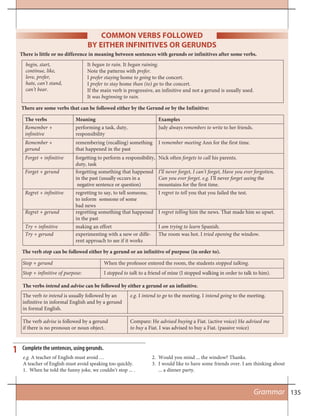
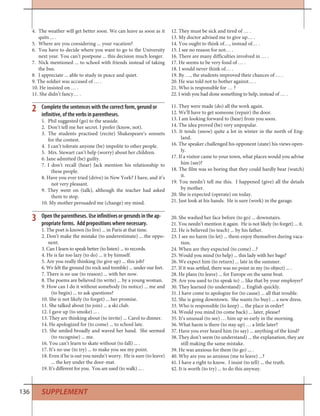
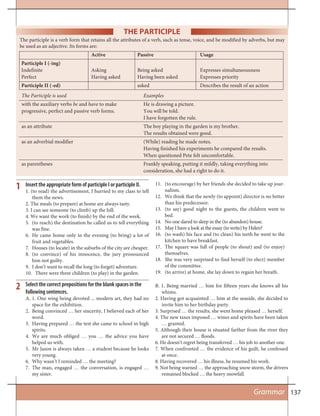
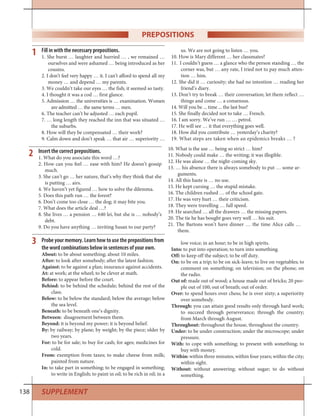
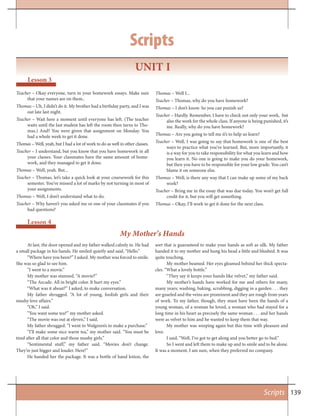
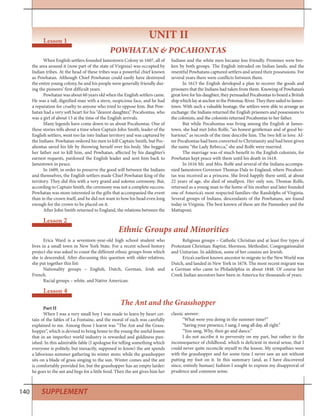
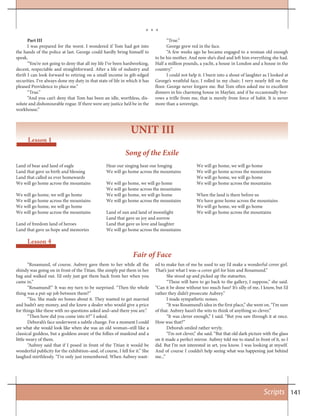
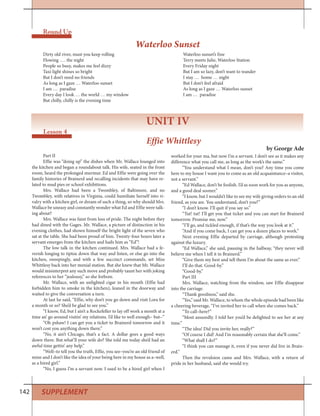
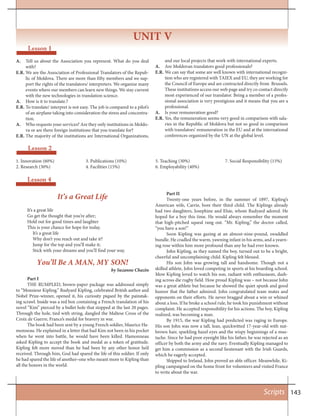
![Descrierea CIP a Camerei Naționale a Cărții
At the Crossroads: Student’s book 12: Margareta Dușciac, Maria Gîscă, Elisaveta
Onofreiciuc [et. al]; comisia de evaluare: Nina Moraru [et. al]; Min. Educației al Rep. Moldova,
English Awareness. – Ed. a 4-a – Chișinău: Arc, 2015 (Tipografia „Balacron“). – 144 p.
ISBN 9975-61-899-1
10400 ex.
811.111(075.3)
A 90
Imprimat la Tipografia „Balacron“
Com. nr. 639
Editura Arc
str. G. Meniuc nr. 3, Chișinău, MD 2009;
tel.: (+373 22) 73-36-19, 73-53-29; fax (+373 22) 73-36-23
e-mail: info.edituraarc@gmail.com; www.edituraarc.md](https://image.slidesharecdn.com/xiilimbaengleza-171208063641/85/Limba-engleza-Manual-pentru-cl-12-145-320.jpg)
